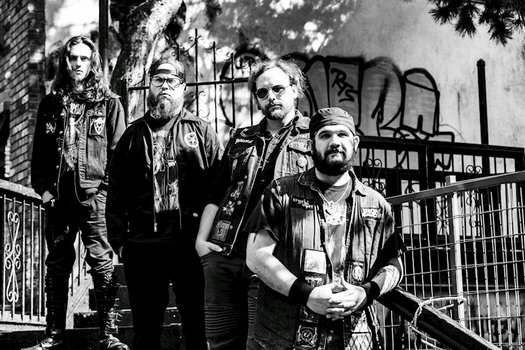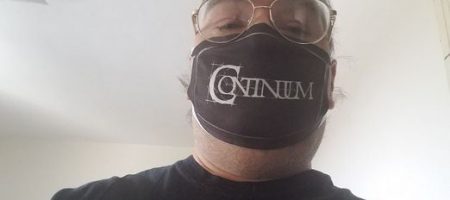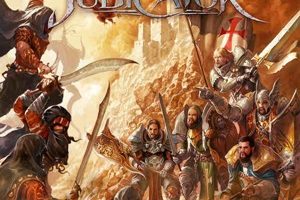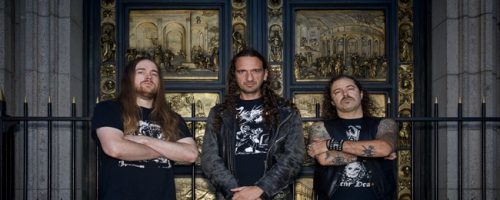Judicator – …And There Was Nothing
Sunday, 9th August 2020
Establishing themselves through a series of self-released efforts and a fervent following willing to aid the cause through crowdfunding, Judicator are proof that hard work can still gain respect and rewards in the metal community. Signing with Prosthetic Records, their fifth and latest studio album Let There Be Nothing is an eight-track effort set out to an eight-act cinematic format – perfect for the band’s power metal platform and penchant for conceptual story telling. Featuring all of the depth of songwriting, hooks, melodies, and harmonies you’ve always come to know and love, the album is fleshed out with special guests that compliment and broaden the appeal of the record.
We reached out to vocalist John Yelland who was very eager to get down to the details of the latest record. We discuss the band’s move to Prosthetic after years on their own, thoughts on his lyrics/vocals for the band, his original attraction to the power metal genre and love of Blind Guardian, plus very insightful conversation about dehumanization and the need for better conversations amongst ourselves as human beings.
Dead Rhetoric: Let There Be Nothing is the fifth Judicator album – and first for Prosthetic Records. Why was now the right time for the band to sign with a record label after spending years doing everything on your own accord?
John Yelland: It really ended up being a choice of our own. We had been working our guts out to make things happen on our own, and we had come to a place where we were doing pretty well. Some really lucky stars lined up. The demand by ourselves was becoming quite difficult, so the record label coming was at the perfect time because it alleviated a good amount of the work from our plates. As far as how the timing and what not, really it was just a matter of Prosthetic taking notice because we were doing so well. Not to sound cocky, but I remember the comment was something like everywhere we go to check out our own bands’ reviews, we see Judicator. They figured that whatever we were doing, we were doing it right. That was a really nice compliment and validating that we are doing things right on our own. The way things are going will be very beneficial to both parties, and to see what we can do for each other.
Dead Rhetoric: Do you think the diversity of the label roster will set you apart? Because many times, people would figure a band like yourselves would align with a label like AFM, that’s more power metal oriented?
Yelland: Yes, I find that very interesting as well. We are friends with Helion Prime, who are signed to AFM. When you think power metal you think AFM or Nuclear Blast – but Prosthetic not so much. We did bring that up, and we found it interesting that they are intentionally trying to diversify and take on a more diverse roster. So now we are labelmates with Paladin, and I think Gama Bomb, we love those two bands so I’m very happy about that.
Dead Rhetoric: How did the recording and songwriting go for this effort – and what does the new lineup of Judicator you believe bring to the table to make the band that much stronger?
Yelland: Let There Be Nothing – all of the music was written by Tony, and it was written pretty much all completed by the time we were done recording The Last Emperor. We had plenty of time to work on this material, and I think that shows. The music is very well refined, and the lyrics especially I’m proud of. Not only is it a very captivating, relatable, and emotional story, in my development as a lyricist and a storyteller I really wanted to implement this idea. I’m really into film analysis and I wanted to take our eight songs we had for this album and arrange the story in such a way that the album matches the template for an eight-act story structure. They are long songs, so as far as the lyrics and story goes there is plenty of breathing room. It hits all those settings, even something like the first culmination is present in Let There Be Nothing. I’m very interested to see how people react to this roller coaster ride.
Dead Rhetoric: Can you discuss some of the special guest choices made for this record in terms of guitarists, vocalists, and keyboard support – do you believe these additions color the record in a broader scope because of those special qualities that outside musicians can bring to the table?
Yelland: Yes, that’s something I’m very happy with Judicator because we’ve never really shied away from bringing in guests like some bands might. We have a long-time friend of mine Austin Bentley who is in Disforia and Machines of Man, I actually tracked all of my vocals with him. We have worked together a lot – and this was a really awesome opportunity to be on the same album together again. We have Mercedes Victoria doing guest vocals on “Gloria”, and Chris Carland did the keyboards on “Strange to the World”, and that adds a level of depth and texture that I think is so unique.
Dead Rhetoric: As the lyricist and vocalist, how would you assess your outlook and importance for the historical/ mythological stories you bring to the table – is it a challenge sometimes to find the right atmosphere or wordplay from time to time to fit the riffs and your range?
Yelland: Yeah, that’s definitely a challenge. The way things have gone traditionally is Tony presents a finished musical product for me, and then I think about what the music says to me. If you were to put a topic with music that doesn’t match the topic, it might work – but it’s not going to be optimal. It really is a matter of what I’m interested in at the time, can that fit? I’ve had times before where I’ve had to go through two or three different story ideas before nailing what this music calls for in terms of theme, characterization. For Let There Be Nothing, I was really interested in Eastern Rome, Byzantium, and I was originally interested in doing this on the Emperor Justinian, but sitting with the story the more I found that Belisarius was the more interesting character. I think the music really did speak to this morality play of his life – and I think the music and lyrics match up very well.
Dead Rhetoric: What would you consider the biggest challenge or struggle Judicator faces in trying to move up the ranks and cement themselves more on the scene?
Yelland: I would say the obstacle that has been with us since the beginning is the difference in location. I’m in Utah, the rest of the band is in Arizona and California and Pennsylvania. We don’t play as much as I would like to – we play festivals whenever we get offers (laughs). We have plans in the future that will allow us to perform more often, once the COVID-19 situation dies down. I’m optimistic for the future.
Dead Rhetoric: Can you think back to what originally attracted you to the power metal genre – and how Blind Guardian became one of your favorite bands? Because I remember a time when Blind Guardian didn’t have a North American record deal until the late 90’s and you had to buy their records on import…
Yelland: Wow! As far as what drew me into power metal, things started with Ozzy Osbourne and Metallica, but then I got into Iron Maiden really heavy. I know Iron Maiden isn’t really power metal, but it’s that grandiose Maiden that made me really open to power metal. Once I discovered power metal, everything I loved about metal was found there.
Regarding Blind Guardian – I think for my tastes and perspective, I think they are the perfect blend between traditional song structures and progressive song structures. Between the aggression and the finesse, between brutal in your face thrashing riffs and sweeping orchestral soundscapes. Very poetic language, but I just love Blind Guardian. For the genre they really are the godfathers. I know that you have Helloween and Gamma Ray as well, but for me Blind Guardian does power metal the best.
Dead Rhetoric: How was it to have Hansi make a guest appearance on your last Judicator record?
Yelland: It was the ultimate second chance. I say that, I had worked with him before on the last Disforia album The Age of Ether to do guest vocals on that. Shortly thereafter the band became inactive, so my one time getting my favorite vocalist to sing with me, now all I’ll remember it by is a dead band with one album that’s not how I want to feel about it. The timelines matched up really well, I got in touch with Hansi and he was willing and eager to do it. I’m happy that he has done vocals for a band that’s much more long lasting.
Dead Rhetoric: How are you handling things during this pandemic – as you work from home, has that increased the desire to be more creative with your musical endeavors and develop more content for social media platforms?
Yelland: It’s funny that you say that, because Judicator is going through some significant changes right now and it’s going to result in some really neat, interesting things for the future as far as songwriting goes. We’ve been working on some songwriting, and I know that we are only in Let There Be Nothing territory right now (laughs). I’m just saying that the next album, for my opinion, is going to be some of the best stuff that we’ve ever done.
Dead Rhetoric: What do you believe you’ve changed your mind the most about over the past five years – and why?
Yelland: I would say the biggest changes have been personal. As it pertains to music, it’s been a constant, steady growth. I have really refined the art and craft of storytelling and lyric writing. I see something of a culmination with that in Let There Be Nothing because I’ve made an eight-act story structure in an album – and to my knowledge that has never been done in a metal album.
I think to… once you master something, some people may want to keep doing it, but what I’ve set up to do with Sleepy Plessow, King of Rome, The Last Emperor I perfected in Let There Be Nothing. So with the new decade coming up… I’m very excited to find new ways to challenge myself as far as the lyrics go. I’m curious to see what other boundaries I can push, and stories I can tell. I don’t know if we are going to continue the pattern of two historical albums, one personal story, two historical albums. The next album will be a personal story. I’m curious to see if we deviate from history on this next decade cycle.
Dead Rhetoric: How do you feel about the state of power and progressive metal today? Are there things you wish bands or musicians would strive for to keep the originality going?
Yelland: From my point of view, I think people are doing just fine. I’ve got a limited point of view because I’m bogged down with my own personal life and I’m not as into the culture as I once was, but I’m still present as a consumer of music. I love it. I look to bands like Nekrogoblikon and I see real creativity. They are trying to do stuff that’s not really done. There is something really unique there. As far as torchbearers for the more traditional kind of power metal, I see bands like ShadowStrike, Seven Kingdoms, MindMaze, the scene is going really well these days. I hope the underground can pick up again after this coronavirus ends – it worries me, venues and promoters going out of business. All of the talent is there, I hope something can be done with it once COVID blows over.
Dead Rhetoric: How would you describe the friendship and respect that has developed between Tony Cørdisco and yourself, and what would surprise people to learn about Tony that they may not know already?
Yelland: Oh geez… Tony and my relationship has been really interesting as it’s a long-distance relationship. We disagree on certain things and agree on certain things. If I had to take that and extrapolate it into something bigger and more meaningful, I’d say that especially for how turbulent and aggressive the world is now, we are more understanding. It sounds cliché, we have to still see each other as human beings. When we start to dehumanize each other, the conversation stops. What worries me, on a broader scale, looking at history when the conversation stops, action starts. We will always have that ongoing conversation with people, even if you may disagree with them. All of this is to just to say, it’s a microcosm of what I would like to see happen in the world.
Dead Rhetoric: If you had the chance to take a time machine and absorb a particular era, what specific period would you move back into?
Yelland: (laughs). I’m sorry, I just think about the Louie C.K. joke where he talks about going into a time machine is something only white people could do. Black people would be like, anything before 1980 – no thank you. Jokes aside… this may be cliché, just to satiate my curiosity alone, it would be to talk to Jesus Christ. There are so many questions.
Dead Rhetoric: What worries or concerns you the most about the world that we live in today – and what do you think the average person needs to put more time, effort, and energy into to make the world a better place for all?
Yelland: Very good question. What concerns me the most with what’s happening today is the dehumanization of each other. The other-ization of each other. On a political level, on a religious level, on a cultural level, on a racial level. I firmly believe seeing each other as human beings and as people. That’s the biggest concern I have, and if there was a hill I would stand on, that’s the platform I would be worried about. Not dehumanizing people and talking to the opposition. Whether it’s the right, the left, Muslim or Christian, whatever, when you dehumanize people the conversation stops. When the conversation stops, your imagination fills in the gaps and you can see that imagination filling the gaps is never helpful. It conjures up the worst, and that worries me.
As far as what people can do. I would say first and foremost, focus on fixing your own life first. Focus on fixing your own family. We live in the United States where we can affect change as a people, so I’m not trying to downplay that. On the other side of things, people get really politically involved, to the point where it possesses people. I’ve seen friendships ruined, I’ve seen family relationships ruined, even relationships and marriages ruined. You are not going to change anything about the world really. The system is thoroughly engrained and built to be resistant to change. Changes take place slowly. I’m very free thinking here. Even Trump coming into office – he wants to make all these big changes, and maybe he does. Whether he is a one term or two term president, within four to eight years some if not all of what he puts into place, how much do you want to bet it gets rolled back?
All of this is to say, getting super bent out of shape about politics strikes me as frustrating. I see it as unnecessarily frustrating.
Dead Rhetoric: What’s on the horizon for Judicator, Dire Peril, or anything else you may be doing on the music front over the next twelve to eighteen months?
Yelland: Judicator, we are releasing the album. We are working on a Patreon which we hope to launch the first quarter of 2021. If coronavirus dies down, then hopefully some festivals. And really the bulk of our attention will be on writing and recording the next album.
As far as Dire Peril goes. Jason is finishing up Helion Prime work now, so I expect late this year or early next year we will start paying more attention to the writing and recording of the next Dire Peril album. I am also in a band called Principium, and we are very close to finishing work on our first full-length album. I’m super excited about this – there are two songs on this album I wrote when I was 19 and 20, and I have been waiting for the opportunity to use these songs. I’ve got other guest session and vocal appearances that will be popping up the rest of the year.

























